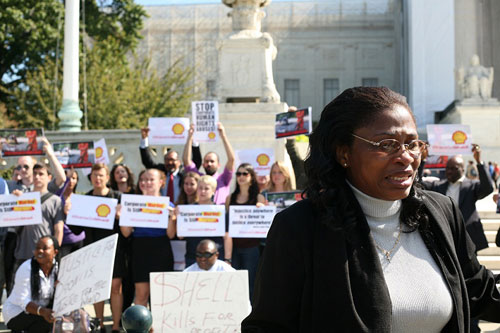
Outside the United States Supreme Court on Monday, a staff member from Earthrights handed Esther Kiobel a page to read. “It’s her story,” he said to a small crowd of dedicated activists holding “#shameonshell” signs. Ms. Kiobel began to read, but soon put the paper down and started talking.
“In an executive meeting, they were trying to get my husband to help get rid of Ken,” she said, speaking of Ken Saro-Wiwa, the environmental activist who led a campaign against Shell’s operations in the Niger Delta, and who was executed by the Abacha government in 1995, together with Esther’s husband Barinem and seven others.
“I was myself charged. I was locked up twice. At night sometimes I go to sleep but then wake up and write what comes out of my head. I was stripped naked. Locked up twice.”
She continued, relating how she was told that if she wanted her husband to be saved, they could join in a meeting in which the two of them and others were being pressured to align their testimonies against Saro-Wiwa; “We both decided it’s not good to lie against Ken Saro-Wiwa. It’s not good to implicate the innocent. That’s how we decided.”
And then the tears overcame her.
Esther Kiobel is the lead plaintiff in Kiobel v Royal Dutch Shell Petroleum, a case poised to determine the future of US legal remedies for human rights abuses, which employs a US law passed in 1789, the Alien Tort Claims Act, to charge that Shell colluded with Nigerian authorities to carry out torture and killings of Ogoni activists.
The focus of this second round of arguments on extraterritorial application of US law centered on possible “friction” in foreign relations and negative impacts for US companies if they were to be held to account in other jurisdictions in a similar manner.
The foremost inquiry was not whether the US should be imposing its understanding of law the world over, and whether it has a proper international human rights policing role to play, but rather if doing so would harm US interests—corporate or governmental—in other arenas.
When the arguments turned to the question of exhausting local remedies, it was not Nigeria—where the events occurred—that the justices were inquiring about; it was the UK and Netherlands, home countries to the company. The unspoken assumption being that the plaintiffs wouldn’t get a fair shake in Nigeria, Justice Alito asked only if the UK and Netherlands were fair judicial systems.
But while it is logical to sue a company where it is incorporated or headquartered, the court should be wary of a corporate-backed jurisdictional shell game.
In this regard, the Chevron-Ecuador experience is relevant. Facing a suit over environmental damage caused by its oil operations in Ecuador, Chevron dragged petitioners and the US court system through a flip-flopping of positions on where it was fair for them to be sued—first arguing vociferously that the case against it should be heard in Ecuador, then crying foul when the Ecuadorian courts handed down a substantial judgment against the company in February last year.
Shell is not arguing for Nigeria as venue, perhaps because of this backdrop and other factors, such as that Nigerian authorities have fined Shell over $5 billion for damages caused by a spill offshore last December. But, it might engage in such an argument, if the US shuts its doors and sends the case to its home countries.
We might not be waiting too long to find out if that would be its plan: today, Friends of the Earth Netherlands and Nigeria announced that a Dutch court will hear environmental claims against Shell in The Hague, with a first required appearance by the parties next week.
Shell should expect to face legal action in any of these jurisdictions—its operations, products, services, employees, financing and profits travel easily across borders to its own benefit. Responsibilities and obligations should not, by contrast, dissipate between filings and motions and legal arguments.
Rich, powerful corporations have the resources to globe-trot to avoid liability. Survivors of mass corruption, human rights abuse and environmental destruction often do not.
